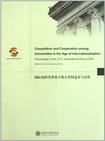国际化时代背景下的大学间竞争与合作
2011-6
上海交通大学出版社
喻恺
288
Hosted by Shanghai Jiao Tong University(SJTU),the Fifth AcademicConsortium 21 International Forum was held in Shanghai from October 18 to 21,2010.The Forum brought more than 100 participants together to discuss the significance of,strategies for,and benefits of the intemationalization of highereduction.In mtendance were representatives from 16 AC21 member institufionsand two institutions considering membership.Additionally.me Forum attractedprofessors and educational specialists from numerous non-member universities andinternational organizations around the globe.
About AC21 About the ContributorsPreface:A Successful AC21 International Forum in ShanghaiSection One:World and World-Class Universities1.The World University-Teamwork in a Time of Financial Turbulence2.Building World-Class Universities in the Age of Internationalization:The“E”Elements in Nagoya University3.Creative Analogies and the Reading of Rankings4.The Effective Use of Global Rankings in Making Institutional Strategic Plans and Positioning for Building a World Class UniversitySection Two:Education/Training Development 5.The Internationalization of Doctoral Education-A Two-Way Approach Promoting Productive Educational Experiences for Phd Students6.A ModeI of Researcher Education that Facilitates InternationaI Research Collaboration and Internationalization of the Curriculum7.Researching Abroad:Developing Self,Developing Nation?8.The Shaping of China’S Postdoctoral Community Section Three:National and University Case Studies9.Using World University Ranking to Inform and Guide Strategic Policy Making:A Case Study of a Canadian Research University10.World.Class Universities or a World-Class System:Which Way for Australia?11.Academic Partnerships in the Age of Globalization:Exploring Policies for Cross.Border Collaboration in Hong Kong12.Undetanding Research Performance:The Evolution of UWA’S Research Management T001.Socrates13.A World.Class University in China?The Case of Tsinghua14.Building World-Class Universities in the Age of InternatiOnaIization 15.Deploying the Chinese Knowledge Diaspora:A Case Study of the 111 Project at Peking University
The impact of the global financial crisis 2008 to 2009 on higher education andresearch around the world has been varied,depending on the immediate effects oneconomies and the flow on effects to national policies and allocations of resources.These effects have been slower to emerge,in research and higher education,and itis only now that some of the serious implications and the requirements for wiseresponses are being understood. Most international university cooperation is between individual academics insimilar fields,assisted through mutual focus on research questions,and a team-work that grows through research societies,exchange or visiting fellowships,anddialogue that is assisted by new communications technologies.Over the past tenyears,there has also been an emergence of faculty or institution level partnershipswhere a more corporate approach is taken,usually to bring a broaderinterdisciplinary team together with the critical mass to address a mutual challenge.In addition,international agencies and governments are sourcing expertise from theleading research universities according to their capacity to address international ornational priorities in developed and developing countries. Higher education and research are recognized internationally as engines forinnovation and economic growth,producing the academic and business leaders ofthe future while developing the capacity to address major issues facing society.TheGFC presents some significant obstacles,but also provides an opportunity to returnto core values and to regain integrity by the appropriate incorporation of socialequity,environmental sustainability and the millennium development goals. The conclusions of international conferences over the past two years of the OECD,UNESCO,the Beijing Forum and many others,have predicted that effectsof the GFC on universities will include reductions in endowments and donations,research contracts with industry,investment and credit,public funding to education and the ability of students to pay increasing tuition fees.There are apparent risks forgraduate unemployment and for the mobility of talented researchers,teachers andstudents.The dynamics of demographics,retirements and replacements of skilledresearchers and teachers are also critical factors requiring attention in planning forthe next 10 to 20 years.
